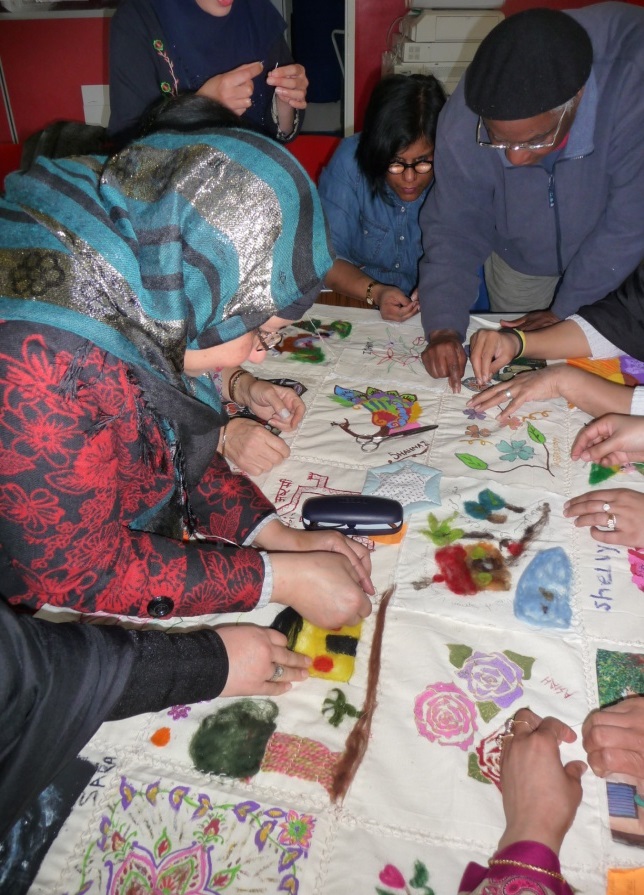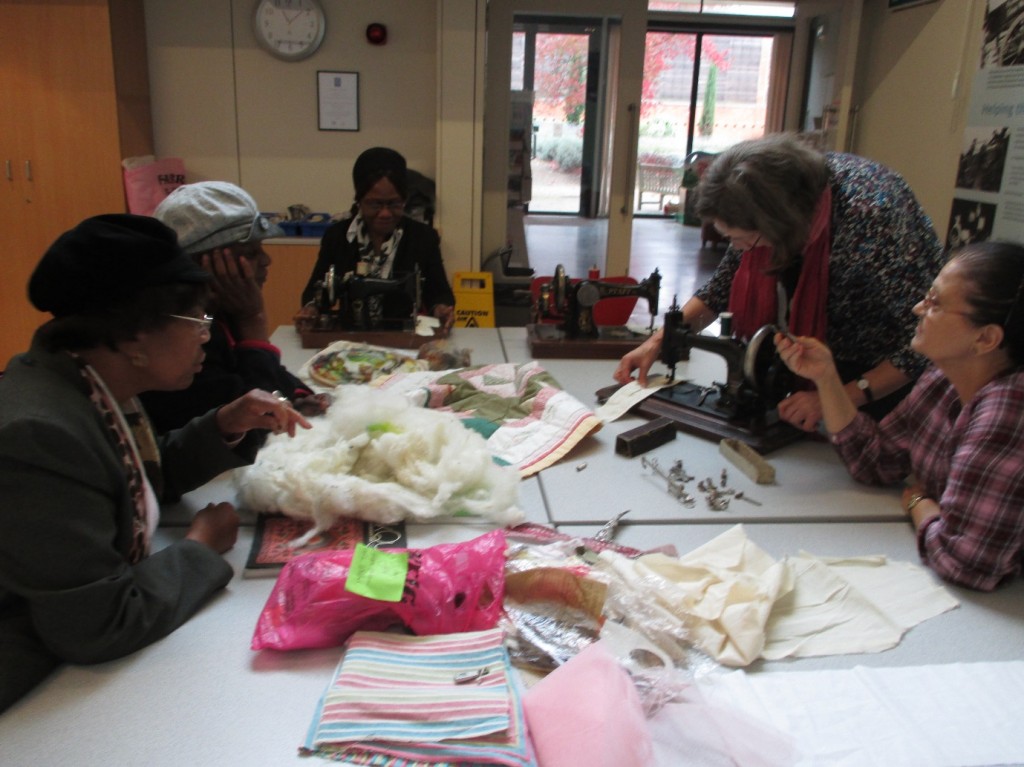Guest post: Our Country Lives project goes global with a ‘Stitch in Time’
MERL Fellow, Dr Jane McCutchan has written a guest post about her project with ‘Permeate’ trainee, Genell Watson, to encourage more visitors to MERL by local people with a BAME background
Local community and wider audiences are at the heart of our re-display and there are many chances to influence how we explore English rural life. ‘Green and pleasant’ was the theme chosen by the organisers for the opening ceremony of the London 2012 Olympic Games, ‘Dull and boring’ was the opinion given by an Afro-Caribbean visitor to the Museum, adding ‘Why would people from ethnic groups in Reading want to come here?’
MERL Curator, Isabel Hughes, understands the challenge. Recent census statistics show that about eight percent of the population of Reading comes from a black or minority ethnic (BAME) community. However, our visitor surveys, carried out as part of MERL’s Heritage Lottery Funded ‘Our Country Lives’ project, show far fewer local people from these backgrounds visit the Museum.
In 2013 MERL had the opportunity to take on a Museum Trainee Fellow, Genell Watson, which was made possible with a bursary from the Arts Council England’s funded ‘Permeate’ scheme. As part of her programme of activity, Genell considered new ways of appealing to local people with a BAME background.
Genell was asked to identify objects which held special significance and top of the list were the sewing machines in the Barnett Collection. She liked the sewing machines because her mother had one and used it to make clothes for the family, in Jamaica.
Here was a common thread, but how could this be transformed into possible contact and outreach? Unlikely as it may seem, this is where I came in. I am a former MERL PhD student, and was recently awarded a Fellowship to compare the marketing strategies of Fowler steam ploughing engines and Singer sewing machines. I shared desk space with Genell under the eaves of the museum and it didn’t take long for us to discover a mutual interest in sewing. I’m a textile artist in my spare time. I dug out my coursework books of eye-catching samples to share with Genell, and an idea began to take shape for a quilt project.
Genell knew local community groups, but would they visit MERL and take part in the project? There was only one way to find out. Over two very wet days in October 2013, the two of us went from local church hall to community centre – 17 in total, with a book of samples and a message, ‘Hello, we are from the University of Reading, Museum of English Rural Life, and would like your help.’ The response was incredulous, ‘What us?’ … but the invitation was received with great pleasure. All of the groups said they would like to visit MERL in the future, and ladies from Slough Roots and the Aman Group volunteered to make our quilt. Reasons for not accepting the invitation at this time were that programme schedules were already full, groups lacked funding for transport to the Museum, and members might be nervous and so a follow-up visit was requested. We have made an application to the Ashley Family Foundation for future funding in the hope that we can work with more groups.
Seven ladies from Slough Roots and the Aman Group, and their Co-ordinator, Cynthia Knight, visited MERL in November 2013 to see old quilts from the collections. Ready to greet them were three sewing machines from the Barnett Collection including a clone of Singer model 28, dating to the 1920s, made for the UK market by Mundlos and Co. of Magdeburg, Germany. Cheap German-made versions of Singer machines were commonplace, when the designs fell out of patent, and were often copied. This one was called a ‘Royal’.
When all the quilt blocks had been assembled, a follow-up visit to Slough for a ‘Quilting Bee’ was made in March 2014. As more and more people stopped by to ‘join the party’, and put a stitch in the ‘Community Lives’ quilt, the noise level rose. The finished quilt will go on display at Slough Public Library on 19th May before returning to Reading to be hung in the Reading Room at MERL.
0 thoughts on “Guest post: Our Country Lives project goes global with a ‘Stitch in Time’”
Leave a Reply
You must be logged in to post a comment.




I have to say this project is wonderful and its great to see the role community groups played. I would like to be updated on any future projects carried and hopr to hear from you.